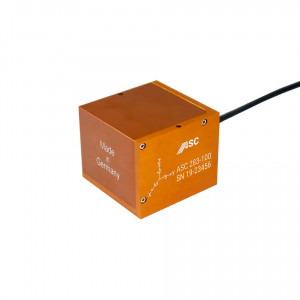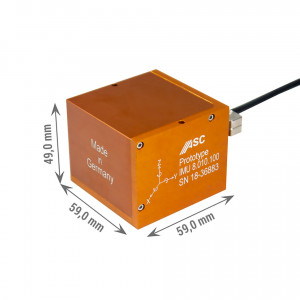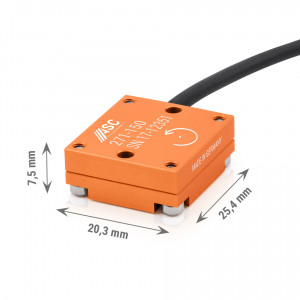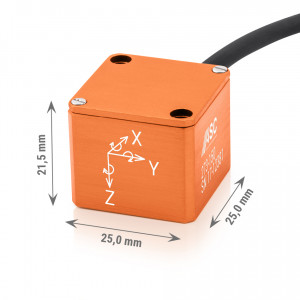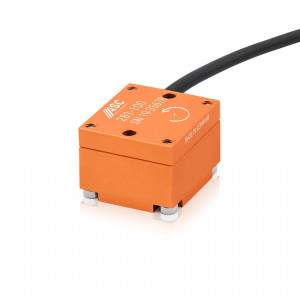3-axis MEMS Gyrometer - ±100 to ±200°/s - Tactical Grade
- Triaxial Tactical Grade MEMS Gyrometer
- Measurement range: ±100°/s or ±200°/s
- Sensitivity: 20 or 10 mV/°/s
- Zero drift: 0.12°/hr
- Bandwidth: 0-100 Hz
- Output: 2m cable
- Power supply: 8 to 30 VDC
- Temperature: -40 to +85 °C
- Non-linearity: < 0.05% FS
- Bandwidth: 0-150 Hz
- Shock resistance: 500g (1ms, 1/2 sine)
- Factory calibration certificate included
Tactical Grade Capacitive Gyrometer
The triaxial ASC 283 gyrometer is built around a high-performance MEMS, combining tactical-grade precision and durability, especially resistant to shocks and vibrations. It is available in two measurement ranges (±100°/s or ±200°/s) with sensitivities of 20 mV/°/s and 10 mV/°/s, respectively, and the output signal is a ±2 VDC voltage.
The measurement also features excellent zero stability (drift: 0.12°/hr, temperature sensitivity: ±0.15°/s, Angular Random Walk: 0.017°/√hr). The ASC 283 is supplied with a calibration certificate. The sensitivity to linear acceleration is 0.02°/s/g.
Installation and Use
The ASC 283 gyrometer is compact, with high shock resistance (95g during operation) and designed for industrial use. It has a 250-gram aluminum housing with an IP67 protection rating. The power supply voltage ranges from 8 to 30 VDC.
A 2m AWG 30 shielded PUR cable is included, with optional cable length and connector configuration based on client requirements. Mounting is achieved via two M3 screws.
Applications
- Localization, Tracking (Marine, Defense)
- Measurement of pitch/roll/yaw
- Motion tracking
- Platform/antenna control
- Robotics
- Manufacturing
- Technologie
- MEMS capacitive
- Number of Axis
- 3 Axis
- Measuring range [°/s]
- 10°/s, 25°/s, 50°/s, 100°/s, 200°/s
- Sensibilité
- 20 / 10 mV/°/s
- Nonlinearity (% FS)
- ± 1 %
- Tension d'alimentation
- 10 Vcc
- Protection Class
- IP65
- Housing
- Aluminium
Nous consulter
- Cable configuration
- Measuring range
- connector
- Data acqusition system
- Embedded system

